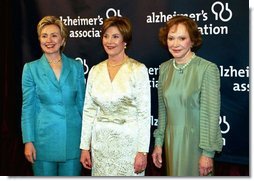For Immediate Release
Remarks by First Lady Laura Bush at the Alzheimer's Association Gala as Delivered
MRS. BUSH: Thank you, George, for your very warm welcome, and thank you all for being here and raising all this money that is going to such a great cause. And thanks to Trish Vradenburg, Paul and Terry for your dedication to families affected by Alzheimer's disease. America is grateful to the Alzheimer's Association for leading the charge in research and treatment. And I'm delighted to be here with Mrs. Carter and Senator Clinton to celebrate the first gala in our nation's capital. There is no better way to celebrate this milestone than by saluting the dedicated caregivers and volunteers who make a difference in so many lives.
I'm happy that my girls were able to spend so much time with my parents - and to learn and laugh with them. We often tell stories about my dad and relive those great memories from their childhood. It's important to me that they remember their grandfather for the funny, caring, strong man that he was - the man before Alzheimer's. My father was eighty when he was diagnosed with this disease. This was a difficult time for my family, especially for my mother, who saw her husband slipping away bit by bit every day. In many ways we were blessed. Since my parents lived in Midland for five decades, they had fifty years worth of friends who offered support. My mother was able to care for my father at home and she had caretakers to help. But she was still the one who bore the greatest responsibility for his care. I remember her reading to my father. He loved stories by Texas writer Elmer Kelton. Those hours spent reading about prairies and cowboys provided a welcome respite for them both. It's difficult for caregivers to cope with the symptoms and the behaviors associated with this tragic disease, and the constant care is physically and emotionally draining. Most of all, the heart wrenching sadness of the slow, disappearance of a loved one can be unbearable. Caregivers need a strong network of people who can provide advice and assistance. And many of you have devoted years of your life and your profession to this cause. Because of you, countless Americans are living better lives. We are making progress against this disease every day. A new generation of drugs are under review, and more are in development. And caregivers are receiving greater training and support. For many of you, taking care of a loved one is not a choice, but part of your character. You are wives, husbands, and children who love someone with an illness. But to so many, you are heroes. Loving someone with all your heart is human. Never giving up is heroic. My father's favorite Elmer Kelton books are about every day heroes and their tales of perseverance. Kelton once said, "I can't write about heroes seven feet tall and invincible. I write about people five foot eight and nervous." Each of you shows the world that you don't need to be seven feet tall to make a difference. True heroes are ordinary people with extraordinary will and strength. Together we can make a difference in the lives of those with Alzheimer's and in the lives of those who love them. Thank you. ### |
|
President
|
Vice President
|
First Lady
|
Mrs. Cheney
|
News & Policies
|
|

